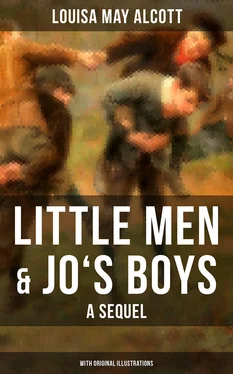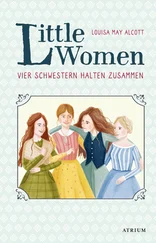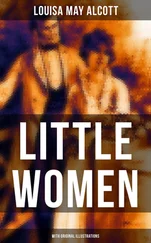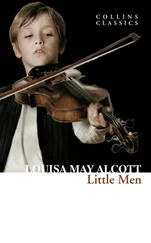So Demi was transplanted to Plumfield, and took so kindly to the life there, that Meg and John and Grandpa felt satisfied that they had done well. Mixing with other boys brought out the practical side of him, roused his spirit, and brushed away the pretty cobwebs he was so fond of spinning in that little brain of his. To be sure, he rather shocked his mother when he came home, by banging doors, saying "by George" emphatically, and demanding tall thick boots "that clumped like papa's." But John rejoiced over him, laughed at his explosive remarks, got the boots, and said contentedly,
"He is doing well; so let him clump. I want my son to be a manly boy, and this temporary roughness won't hurt him. We can polish him up by and by; and as for learning, he will pick that up as pigeons do peas. So don't hurry him."
Daisy was as sunshiny and charming as ever, with all sorts of womanlinesses budding in her, for she was like her gentle mother, and delighted in domestic things. She had a family of dolls, whom she brought up in the most exemplary manner; she could not get on without her little work-basket and bits of sewing, which she did so nicely, that Demi frequently pulled out his handkerchief display her neat stitches, and Baby Josy had a flannel petticoat beautifully made by Sister Daisy. She like to quiddle about the china-closet, prepare the salt-cellars, put the spoons straight on the table; and every day went round the parlor with her brush, dusting chairs and tables. Demi called her a "Betty," but was very glad to have her keep his things in order, lend him her nimble fingers in all sorts of work, and help him with his lessons, for they kept abreast there, and had no thought of rivalry.
The love between them was as strong as ever; and no one could laugh Demi out of his affectionate ways with Daisy. He fought her battles valiantly, and never could understand why boys should be ashamed to say "right out," that they loved their sisters. Daisy adored her twin, thought "my brother" the most remarkable boy in the world, and every morning, in her little wrapper, trotted to tap at his door with a motherly "Get up, my dear, it's 'most breakfast time; and here's your clean collar."
Rob was an energetic morsel of a boy, who seemed to have discovered the secret of perpetual motion, for he never was still. Fortunately, he was not mischievous, nor very brave; so he kept out of trouble pretty well, and vibrated between father and mother like an affectionate little pendulum with a lively tick, for Rob was a chatterbox.
Teddy was too young to play a very important part in the affairs of Plumfield, yet he had his little sphere, and filled it beautifully. Every one felt the need of a pet at times, and Baby was always ready to accommodate, for kissing and cuddling suited him excellently. Mrs. Jo seldom stirred without him; so he had his little finger in all the domestic pies, and every one found them all the better for it, for they believed in babies at Plumfield.
Dick Brown, and Adolphus or Dolly Pettingill, were two eight year-olds. Dolly stuttered badly, but was gradually getting over it, for no one was allowed to mock him and Mr. Bhaer tried to cure it, by making him talk slowly. Dolly was a good little lad, quite uninteresting and ordinary, but he flourished here, and went through his daily duties and pleasures with placid content and propriety.
Dick Brown's affliction was a crooked back, yet he bore his burden so cheerfully, that Demi once asked in his queer way, "Do humps make people good-natured? I'd like one if they do." Dick was always merry, and did his best to be like other boys, for a plucky spirit lived in the feeble little body. When he first came, he was very sensitive about his misfortune, but soon learned to forget it, for no one dared remind him of it, after Mr. Bhaer had punished one boy for laughing at him.
"God don't care; for my soul is straight if my back isn't," sobbed Dick to his tormentor on that occasion; and, by cherishing this idea, the Bhaers soon led him to believe that people also loved his soul, and did not mind his body, except to pity and help him to bear it.
Playing menagerie once with the others, some one said,
"What animal will you be, Dick?"
"Oh, I'm the dromedary; don't you see the hump on my back?" was the laughing answer.
"So you are, my nice little one that don't carry loads, but marches by the elephant first in the procession," said Demi, who was arranging the spectacle.
"I hope others will be as kind to the poor dear as my boys have learned to be," said Mrs. Jo, quite satisfied with the success of her teaching, as Dick ambled past her, looking like a very happy, but a very feeble little dromedary, beside stout Stuffy, who did the elephant with ponderous propriety.
Jack Ford was a sharp, rather a sly lad, who was sent to this school, because it was cheap. Many men would have thought him a smart boy, but Mr. Bhaer did not like his way of illustrating that Yankee word, and thought his unboyish keenness and money-loving as much of an affliction as Dolly's stutter, or Dick's hump.
Ned Barker was like a thousand other boys of fourteen, all legs, blunder, and bluster. Indeed the family called him the "Blunderbuss," and always expected to see him tumble over the chairs, bump against the tables, and knock down any small articles near him. He bragged a good deal about what he could do, but seldom did any thing to prove it, was not brave, and a little given to tale-telling. He was apt to bully the small boys, and flatter the big ones, and without being at all bad, was just the sort of fellow who could very easily be led astray.
George Cole had been spoilt by an over-indulgent mother, who stuffed him with sweetmeats till he was sick, and then thought him too delicate to study, so that at twelve years old, he was a pale, puffy boy, dull, fretful, and lazy. A friend persuaded her to send him to Plumfield, and there he soon got waked up, for sweet things were seldom allowed, much exercise required, and study made so pleasant, that Stuffy was gently lured along, till he quite amazed his anxious mamma by his improvement, and convinced her that there was really something remarkable in Plumfield air.
Billy Ward was what the Scotch tenderly call an "innocent," for though thirteen years old, he was like a child of six. He had been an unusually intelligent boy, and his father had hurried him on too fast, giving him all sorts of hard lessons, keeping at his books six hours a day, and expecting him to absorb knowledge as a Strasburg goose does the food crammed down its throat. He thought he was doing his duty, but he nearly killed the boy, for a fever gave the poor child a sad holiday, and when he recovered, the overtasked brain gave out, and Billy's mind was like a slate over which a sponge has passed, leaving it blank.
It was a terrible lesson to his ambitious father; he could not bear the sight of his promising child, changed to a feeble idiot, and he sent him away to Plumfield, scarcely hoping that he could be helped, but sure that he would be kindly treated. Quite docile and harmless was Billy, and it was pitiful to see how hard he tried to learn, as if groping dimly after the lost knowledge which had cost him so much.
Day after day, he pored over the alphabet, proudly said A and B, and thought that he knew them, but on the morrow they were gone, and all the work was to be done over again. Mr. Bhaer had infinite patience with him, and kept on in spite of the apparent hopelessness of the task, not caring for book lessons, but trying gently to clear away the mists from the darkened mind, and give it back intelligence enough to make the boy less a burden and an affliction.
Mrs. Bhaer strengthened his health by every aid she could invent, and the boys all pitied and were kind to him. He did not like their active plays, but would sit for hours watching the doves, would dig holes for Teddy till even that ardent grubber was satisfied, or follow Silas, the man, from place to place seeing him work, for honest Si was very good to him, and though he forgot his letters Billy remembered friendly faces.
Читать дальше












